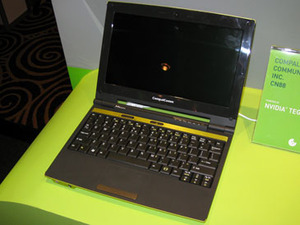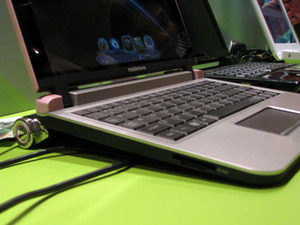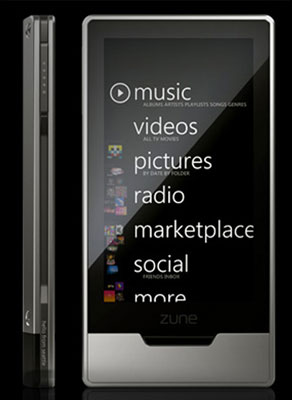
Exciting New Technology
Although Nvidia knows its core business is graphics cards, the company has been looking at ways to broaden its horizon. One area where it has dabbled a bit in the past is in the mobile phone market, but it wasn’t until Computex 2008 that Nvidia really started to build up some momentum.That is thanks, in large part, to the announcements it made regarding its Tegra system on a chip. It’s taken time for Nvidia to build up momentum though and the company didn’t anticipate how long it’d take mobile phone operators to start adopting the technology.
It was pleasing to see at this year’s show, then, that the company had made some significant steps forward, as it not only demoed a complete Tegra system in a form factor barely bigger than a USB thumb drive. In fact, the reference board fits in a SO-DIMM slot, which enables OEMs to make easily upgradeable products based on the platform.
Tegra will enable a new class of always on, always connected devices that sit between a smartphone and a netbook. The devices that we’ve seen mainly focused around the 7in form factor, but there will be some 10.1in models as well.
All of them will feature a 1,024 x 600 native resolution in order to deliver a good internet experience (since most websites are designed for a minimum width of 1,024px). Forget about measuring battery life in hours, you’ll be measuring a Tegra-based machine’s standby time in days – how does 25 days of music playback sound? Pretty damn good if you ask us.


Tegra will be everywhere
Probably the biggest question that we had when Nvidia first started talking about these new mini-netbooks was how Nvidia’s partners were going to bring Tegra machines to the market. Well, the answer is quite simple – they’re effectively going to be given away with a mobile data tariff. Some will be free, and virtually every device will be under $99 USD. Nvidia has been talking with the telcos and although there haven’t been any announcements thus far, we expect them to follow in the not too distant future.

Microsoft's Zune HD is powered by Nvidia Tegra
And while we're speaking of Microsoft, the company's new Zune HD portable media player is powered by Nvidia's Tegra chip, enabling smooth HD video playback on a handheld device (and also to a TV screen using a video output cable). Although Zune hasn't been a huge success in its first incarnations, Zune HD is a massive design win for Nvidia and it shows the potential for other media players (or smart phones) from other manufacturers as Nvidia has said there are more Tegra handheld design wins than just the Zune HD.
Tegra is a massive play for Nvidia, as the company said it has invested over $500 million and five years of research and development time in bringing the sub 1W system on a chip to market. It also relies heavily on the ARM CPU architecture becoming more relevant outside of the mobile phone market because, currently, most software is developed for x86 processors. ARM is confident though and it recently said that it believes that, by 2013, Microsoft will have no choice but to support its CPUs in its fully fledged Windows OSes.
It’s a good thing, then, that Google has announced Chrome OS and said that it will support ARM processors from the outset. When something like that happens, you know you’ve done something right – an entirely web-based operating system such as Google Chrome OS could be a match made in heaven for Tegra, because Nvidia’s vision is for there to be as little time spent messing around with software installation as possible. If everything’s on the web, there is no installation.
With all of that in mind, we expect to see many mini-netbooks running Chrome OS when it comes out.

MSI MPG Velox 100R Chassis Review
October 14 2021 | 15:04








Want to comment? Please log in.